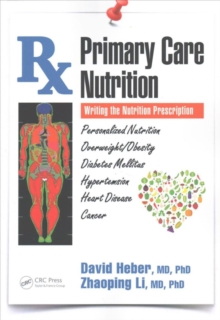Description
| Product ID: | 9781138062269 |
| Product Form: | Paperback / softback |
| Country of Manufacture: | US |
| Title: | Primary Care Nutrition |
| Subtitle: | Writing the Nutrition Prescription |
| Authors: | Author: David Heber, Zhaoping Li |
| Page Count: | 392 |
| Subjects: | Dietetics and nutrition, Dietetics & nutrition |
| Description: | Select Guide Rating Primary care physicians have limited time and resources to incorporate nutritional advice into daily practices. This book provides practical applications of proper nutrition practices in disease management, prevention, and treatment. Chapters approach the overweight/obese patient and cover the role of dietary supplements, food addiction, food allergy, and food intolerance. Other topics include type 2 diabetes mellitus, managing diabetes without weight gain, nutrition and coronary artery disease, lipid disorders, fatty liver, heart failure, immune function, hypertension, cancer, and personalized nutrition. This book contains the necessary knowledge and tools to incorporate nutrition into primary care practice. As a practical matter, this effort is led by a dedicated primary care physician with the help of motivated registered dietitians, nurses, psychologists, physical therapists, and office staff whether within a known practice or by referral to the community. It is essential that the nutrition prescription provided by the physician be as efficient as possible. While many team members have superior knowledge in the areas of nutrition, exercise, and psychology, the health practitioner remains the focus of patient confidence in a therapy plan. Therefore, the endorsement of the plan rather than the implementation of the plan is the most important task of the physician. This book proposes a significant change in attitude of primary health care providers in terms of the power of nutrition in prevention and treatment of common disease. It features detailed and referenced information on the role of nutrition in the most common conditions encountered in primary care practice. In the past, treatment focused primarily on drugs and surgery for the treatment of disease with nutrition as an afterthought. Advanced technologies and drugs are effective for the treatment of acute disease, but many of the most common diseases such as heart disease, diabetes, and cancer are not preventable with drugs and surgery. While there is mention of prevention of heart disease, this largely relates to the use of statins with some modest discussion of a healthy diet. Similarly, prevention of type 2 diabetes is the early introduction of metformin or intensive insulin therapy. |
| Imprint Name: | CRC Press |
| Publisher Name: | Taylor & Francis Ltd |
| Country of Publication: | GB |
| Publishing Date: | 2017-06-19 |


